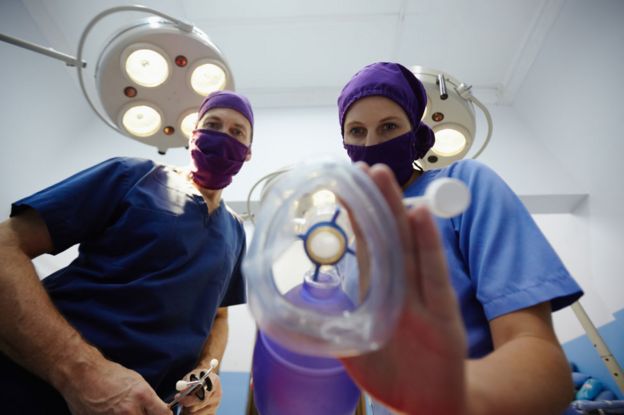Goldilocks: Not Too Much, Not Too Little: Just Right
"Using the lean body weight formula [in sedating a patient for surgery through the application of anesthetic] probably isn't the best method to dose your propofol in the morbidly obese patient, because it results in under-dosing."
Dr. Jean Wong, anesthesiologist, Toronto Western Hospital
"I have been practising for over 25 years -- so over 25,000 anesthetics -- and so far have not had one patient mention awareness as a problem."
"Having said that, obesity is becoming more common and more severe all the time. No one really knows how to adjust the doses of drugs for large patients."
"The problem affects all drugs. Are bacterial infections adequately treated if obese patients are given too little antibiotic? Do obese people die of heart attacks if they are given too much or too little of various medications?"
"No one knows."
Dr. John Friesen, anesthesiologist, University of Manitoba
 |
| The right dose of propofol required is certainly higher than the lean body weight but a littler lower than total body weight: Carl de Souza/AFP/Getty Images |
Now, it seems, the obese have yet another health impact to worry about: during surgery, the application of anesthetic insufficient to take into account their morbid body weight having the potential to lean toward their 'waking up' at a most inconvenient time throughout the surgical process when in theory and in practise, they are imagined to be fully sedated, unaware of what is happening to them.
One woman's experience was narrated as part of a large audit of "accidental awareness during general anesthesia" published in a British review that discovered a disproportionate number of people had reported their unfortunate experience with the terrifying phenomenon -- all of whom were obese patients. And now, a new Canadian study published in the Canadian Journal of Anesthesia for which Toronto Western Hospital's Dr. Wong was the senior author, has identified a failing in the standard formula calculating the amount of anesthetic required to induce unconsciousness in surgical patients.
Even while there is an ever-growing demographic of people with morbid obesity, defined as a BMI of 40 or more, anesthesiologists base induction doses of the most commonly used anesthetic, propofol on lean body weigh represented by an obese individual's body weight, subtracting the fat quotient. There is a reason for that; caution. Due to the fear that by using total body weight to calculate the amount of propofol needed could lead to overdosing the extremely obese. Serious complications can ensue with such an overdose; a rapid drop in blood pressure, decreased blood flow to the heart and brain.
Dr. Wong's study found that the use of lean body weight for calculating doses in the morbidly obese results in an "insufficient" depth of anesthesia in 60 percent of the cases studied. That lack of depth leads to accidental awareness because of the failure to deliver enough anesthetic to the body. Researchers randomly assigned sixty patients undergoing bariatric (stomach-shrinking surgery) to one of two groups.
The first group had doctors dosing propofol using the lean body weight calculation. For the second group doctors used a unique device known as a bispectral index monitor (BIS) to measure brain activity which determines how the anesthetic has succeeded in sedating the patient. The monitor uses he information to translate to a number from 100 (person is wide-awake) to zero (no brain electrical activity). Once the number dropped to 50, the propofol infusion was stopped.
Eighteen out of thirty people remained "responsive" after the initial propofol dose, requiring additional infusion before a sufficient level of sedation was achieved. In the group monitored by the bispectral index monitor of the brain on the other hand only one patient remained "responsive" when the target of BIS 50 was reached. Propofol is highly fat soluble making it more difficult to reach sufficient levels in specific target receptors in the brain to properly sedate people entering surgery.
Numerous reports of obese patients reporting "falling asleep", then waking while a breathing tube was being inserted, or alternately at the beginning of the surgery, were documented in the largest prospective study on accidental awareness by Dr. Jaideep Pandit, consultant anesthetist at Oxford University Hospitals. Dr. Pandit felt the results of this new study demonstrates "that the true dose of propofol required is certainly higher than LBW (lean body weight) but a little lower than TBW (total body weight)."
And then, there is this: most frequently people of "normal" weight exclusively take part in drug trials.
 |
| Thinkstock |
Labels: Bioscience, Health, Research, Surgery

0 Comments:
Post a Comment
<< Home